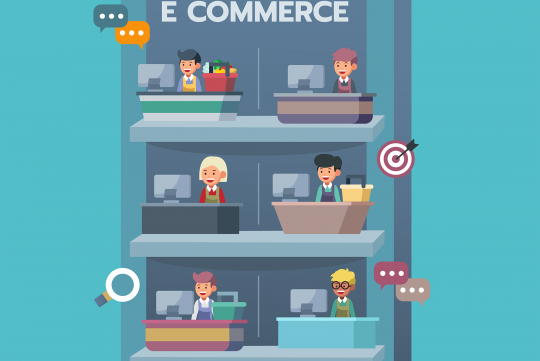What is Affiliate Marketing?
Affiliate marketing is a type of digital content marketing, wherein the marketer partners with a supplier (typically a large eCommerce store) through an affiliate program and uses their platform to coax the end-user into performing the desired action

In its purest form, affiliate marketers direct their audience to the affiliate partner to complete sales – gaining a commission each time. Commonly, affiliate marketers will leverage popular blog websites, directing traffic to eCommerce stores through product reviews and recommendations.
Sometimes an affiliate program will offer compensation for other actions, usually pay per click (PPC) through ads & links inserted throughout your webpage or payment per lead generated (e-mails gathered, online forms filled in, etc.).
The standard affiliate marketing model for sales-based affiliate marketing (PPS, pay per sale, sometimes referred to as PPP – pay per performance) is to utilize a blog-style page and build yourself as an authority within the niche. This takes time and effort to achieve, but with a bit of work results in profit and a saleable digital asset.
It is easy for anyone to make a start in affiliate marketing, with no prior experience or skills needed. However, to succeed, you will need to put the work in, at least initially.
Many digital nomads (world-travelers working remotely) are turning to affiliate marketing as a passive source of income to supplement or replace their earnings. Conversely, many others are building entire businesses through affiliate marketing, either by having a considerably large enough portfolio of websites or by teaching others how to succeed.
Over time, affiliate marketers will need to become competent in several areas of digital marketing, including – SEO (search engine optimization), web development, content creation/copywriting, and design – however, no specialist skills are needed in the beginning.
Most affiliate marketers enter the industry with little to no knowledge of any of these areas and learn while doing. Affiliate marketing is very open and numerous quality blogs and Facebook groups are giving out highly actionable, relevant advice for free.
What is Dropshipping?
Dropshipping works very similarly to how a brick and mortar shop is run, you purchase goods at wholesale and sell them on at retail prices – pocketing the difference.
However, dropshipping is an entirely digital process during the transaction stage, and since goods are purchased on an on-demand basis, there is no need to keep stock.

The basic principle of dropshipping works like this:
To get started with dropshipping, you first need to build your web store, and unlike affiliate marketing, which usually requires the marketer to remain in one niche (although there are plenty of successful general affiliate sites too), you choose the products for your dropshipping website.
This means there is a broader scope of items you can sell, not only that, but you set the price too – increasing or lowering your profit margins for each product. This leads to much easier branding opportunities than with affiliate marketing, and since you deal with the payment transactions, you have access to a wealth of data you can use to create repeat business.
One downside of this is because the customer purchases goods directly from your store; you are responsible for their customer experience i.e., if anything is wrong with their order or the shipping is delayed, they will come straight to you.
The customer service responsibility demands have caused many to abandon dropshipping or stopped them from pursuing it entirely. However, more and more dropshippers are utilizing freelance customer support services through websites like Upwork and Fiverr to ease the pressure.
Similar to affiliate marketing, dropshipping requires little to no previous experience or knowledge of the industry. The same skills are applicable and will need to be learned during your dropshipping journey – SEO, web development, design, content creation/copywriting, and general marketing techniques.
Pros of Affiliate Marketing
Affiliate marketing and dropshipping both have their advantages and disadvantages, and the one you choose will likely depend on your personal situation and lifestyle. Affiliate marketers will make the case for affiliate, and dropshippers will tell you dropshipping is the best path to take in eCommerce.
Neither is strictly right or wrong, but to help you make a decision I have listed out the pros and cons for each so you can make up your own mind about the direction you want to take.

You can get started with a small initial investment
With no need to purchase stock or have a storefront, the start-up costs of affiliate marketing are very low compared to the earning potential. Since most people already have a laptop and access to the internet, they have everything they need to get started.
Almost all tools (or a version of) that budding affiliate marketers need to be successful are available for free. Many affiliate marketers who started their journey on a shoe-string budget and had no experience in the industry now give away valuable, actionable information weekly.
You can find a list of my favorite affiliate marketing blogs.
Paid courses are easier to come by but can be quite an investment for new marketers. Still, it is entirely possible to learn all the skills needed without spending a penny through intelligent searching and networking.
If you are starting with a sizeable budget however, you can find a list that I compiled of the best affiliate marketing courses.
No prior knowledge or experience needed
Affiliate marketing is open to everyone, no matter where you are in your life, you can begin affiliate marketing. A large portion of affiliate marketers are students looking to earn during their studies, or people just trying to supplement their income from full-time work.
There are only two requirements to start earning with affiliate marketing, the right attitude, and the drive to keep going and improving on what you have already done.
In many cases, the most successful affiliate marketers aren’t the most knowledgeable or skilled, but the most driven and persistent.
Flexibility and freedom
More and more people are seeking a greater level of work/life balance. With affiliate marketing, you can work as little or as much as you desire — passive earnings from affiliate marketing fund an enviable lifestyle for many world travelers.
However, it is worth noting that in the beginning, there is a lot of legwork involved to get to this point, but the freedom that affiliate marketing offers is worth the investment.
Passive income
As stated above, passive income is a massive reason many get into affiliate marketing. Making money while you sleep is quite literally the dream.
Not only that, but income from one site can be used to invest in a second site, growing your income exponentially. Some prefer to build, scale, and flip websites over short periods.
Since affiliate sites can be sold for up to 36x their monthly revenue, it is common to flip a site and invest the profit into a more significant, more profitable site, increasing earnings each time.
No need to create or stock products
Dropshipping and affiliate marketing both share this quality; however, affiliate marketers have the advantage that they are in no way part of any transaction. Since affiliate marketers are effectively just referring customers to the supplier, they are not responsible for any part of the transaction or shipping process.
Scalability
It takes a while and might even require that you team with other affiliate marketers. But it is entirely possible to build a business around affiliate marketing websites.
Two standard methods to do this are building an extensive portfolio of affiliate sites over time, building & flipping affiliate sites, or a combination of both. With the right team on board, the earning potential from affiliate marketing is massive – in recent years the New York Times purchased the Wirecutter (product review affiliate site) for $33million
Pros of Dropshipping
Affiliate marketing is looking pretty good by now, but wait up.
We still need to see what dropshipping has to offer the world of eCommerce - there are as many similarities as there are differences between the two, and you should fully understand the pros and cons of each before making a decision.

Low-risk business model
Both affiliate marketing and dropshipping are low-risk businesses, as they hold no stock, nor do they require any physical property.
However, affiliate marketers are at the mercy of their affiliate program, which can change unexpectedly – commission percentages have been known to change overnight. If you have gone from 10% to 5%, you have lost half your earnings instantly.
With dropshipping, you also receive your profits immediately, since you deal with the transaction directly with the customer. Some affiliate programs won’t let you cash out your commission earnings until a threshold limit has been reached.
High-profit margins
Affiliate marketing requires no input beyond enticing customers to complete the desired action with your supplier, unlike dropshippers, who are responsible for the customer experience after a sale has been made.
However, this extra work comes with an additional reward. Dropshippers set their own product prices, meaning they can make as much or as little profit as they like.
Of course, this has to be reasonable; otherwise, customers will just take their business elsewhere. However, it is not uncommon for dropshippers to make $10 sales on $1 items – that’s a 1000% return on investment.
Brandable
Since dropshipping websites are eCommerce stores in their own right, it is far easier to create a reputable brand. Unlike affiliate marketing, where scalability commonly means more websites, dropshipping allows you to curate and grow a brandable asset.
Placing your focus on growing a single site is the preferred option for many.
Repeat business
Affiliate websites rarely get repeat business; once a customer has been referred to the supplier, they will likely go straight to source next time.
Since dropshipping allows you to develop a trusted brand and operates the same as any other eCommerce store from the customer perspective, repeat business is easily gained. Dealing with transactions also leaves you with a host of data, providing plenty of opportunities to market directly to customers that have already purchased from you.
Low-cost start-up
The capital necessary to start a dropshipping business is negligible. As long as you have a laptop or computer and can connect to the internet, you have everything you need. Additional, small, fee’s to procure a domain and host your website are needed but are inexpensive.
Like affiliate marketing, dropshipping requires the right attitude and a dedication to learning the needed skills to create success.
Cons of Affiliate Marketing
So, we’ve looked at the good stuff, but now it’s time to take a peek behind the curtain and look at some of the drawbacks of affiliate marketing.
If you’re expecting overnight success, pulling in $1000 dollars revenue daily - then I’m sorry to say you’re out of luck. However, if you are realistic with your expectations then affiliate marketing can be a great source of income.
Before you can make a truly informed decision you should be aware of the negative side to affiliate marketing.

At the mercy of affiliate programs
Affiliate programs have been known to reduce commission levels without warning, slashing earnings dramatically. Like what Amazon Associates Program has done during COVID-19 era! Some programs are also extremely strict about what can appear on pages that feature affiliate links to their site, and manual reviews can result in you being removed from the affiliate program.
Some affiliate programs also place a threshold on your withdrawals, only allocating your commissions to you once a specified target has been met.
Only make a small percentage per sale
Some products only offer 3% commission per sale, to be a successful affiliate marketer you need to drive a lot of traffic to the supplier to make any real money. For example, Walmart Affiliate Program pays from 1% to 18% commission based on the category.
Lack of trust – lost opportunities
A lot of customers are under the belief that by buying through affiliate links, they are going to be charged more. And while this is untrue, it can hurt your conversions leading to lower profits.
You can convince a customer to buy a product, but if they don’t purchase through your link, you will make no money from your efforts.
Lack of repeat business
Once you have referred a customer to your supplier and they have completed a sale, chances are they will go straight to source for their next purchase. It is tough to garner repeat business in affiliate marketing.
Cons of Dropshipping
Before you rush off and totally disavow affiliate marketing, make sure you’re aware of the downsides to starting a dropshipping business.
One of the biggest, and most unexpected, pitfalls of dropshipping is the customer service aspect. You are responsible for the customer experience and subsequent support.
Not everyone is happy to have such a high level of customer involvement, and you need to make sure you are happy to take on the additional responsibilities before setting up your dropshipping store.

Managing customer support
By dropshipping, you are running an eCommerce store and, as such, are responsible for the customer experience. If the product is unsatisfactory, or shipping is late, then the customer will be coming to you for answers.
This is one of the most significant factors turning people away from dropshipping.
Strong competition
While competition is intense in both dropshipping and affiliate marketing, affiliates in the same niche will generally be promoting the same products, which in turn means they are the same price.
However, since dropshippers can set their profit margins through product pricing, you will likely lose business to another dropshipper undercutting you.
Reliant on the supplier
While affiliate marketers are at the mercy of their affiliate program, dropshippers are also heavily reliant on having a reliable supplier for their goods. If the supplier continually ships goods late, or the product is often broken or subpar on arrival, the dropshipper has to deal with the customer.
There are many dropshipping horror stories on the web about unreliable suppliers, and you may have to try several before the process works as you want it to.
Summary
I hope this article has helped to clear up some questions you may have had when considering affiliate marketing vs. dropshipping as a digital content marketing venture.
Is there anything I missed or that you would like to see added? Let me know in the comment box below.
At Affiliate Ghost, I am looking to deliver the most relevant, actionable, content marketing tips. So, if there are any topics you would like me to cover, don’t hesitate to get in touch.
Share the Love
If you found this post useful, please let others know about it by sharing it.






